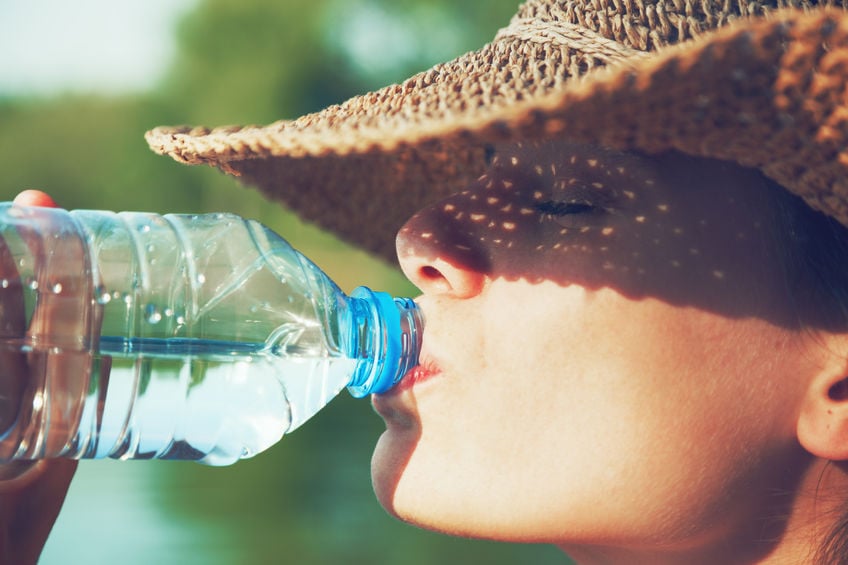@VLM_Dr_Jodi
The human soul is like water
From heaven it descends and to heaven it rises again;
Then it must fall once more to earth,
In eternal flux.
~Goethe
The question of how much water
Water gives life to all things. It is absolutely essential to our survival. About 60 percent of your body weight is from water. The human body requires a certain amount of water daily to properly perform its functions; such as, flushing toxins out, carrying nutrients to your cells, and creating a moist environment for the throat, nose, and ears. The amount varies individual by individual and is dependent on activity level, size, the climate you live in, your health status, and if you are pregnant or breastfeeding. Lack of water can lead to dehydration and can drain your energy and make you tired. The Institute of Medicine (IOM), through its Food and Nutrition Board (FNB) has established dietary reference values for the intake of nutrients and has set general recommendations for water consumption. For women, it is approximately 2.7 liters (91 ounces) of total water – from all beverages and foods – each day, and for men an average of approximately 3.7 liters (125 ounces daily) of total water.1 Most healthy people adequately meet their daily hydration needs by letting thirst be their guide.
The question of the quality of water
Have you ever noticed when you are drinking water from your faucet at home tastes differently from another source? If not, I encourage you to sharpen your sensitivity to the taste of water and the variety of sources it comes from. The source of water could be from rain, a natural spring, distilled, filtered, mineral, tap, etc.
Our tap water is far from being free of pollutants. Public authorities set maximum rates and then give the local water boards responsibility for monitoring water quality to ensure that these thresholds are not exceeded. Because these rates are set in accordance with the criteria of the economy, politics, and procedural realities, the purity of tap water is far from guaranteed. Truthfully speaking, a certain number of pollutants are quite simply absent from the lists drawn up by public work departments and thus are not subject to any monitoring or control. Among these pollutants are hormonal residues from factory farming, which eventually will infiltrate our water tables in the same way that improperly discarded prescription drugs already have.2 This leads me to the importance of filtering your water. Selecting a water filter is a broad topic that I humbly decline discussing in this brief article. I direct you elsewhere in my health tips. I urge you in considering a water filter. Investigate your source of water.
Another, topic that comes up as it relates to water is the water that contains carbonation. Have you ever been confused about the options of carbonated water? Let me break it down for you. There are sparkling mineral, seltzer, club soda, and tonic waters. Sparkling mineral water is natural spring water that contains minerals and naturally occurring carbonation. Seltzer water is just plain water with artificial carbonation. Club soda water is similar to seltzer water except that mineral-like ingredients are added to enhance the flavor. Tonic water is a bitter carbonated water and is unlike other carbonated waters in that it contains calories. I recommend filtered water as the primary source of daily water intake as the most healthy option. Carbonated water in the form of sparkling mineral water taken in from time to time is okay. Avoid tonic water if you are watching your caloric intake. If you experience irritable bowel syndrome, avoid carbonated water altogether as it can cause bloating.
Health tips
Gain awareness of your daily water intake by tracking it through creating a water journal for one week duration. After completing the water journal, try maintaining a daily intake of water that is equal to one-half your body weight in ounces. Note how you feel.
I suggest the following website to patients who are investigating water filtration: www.custompure.com
I couldn’t resist adding this weight loss tip taken from Dr. Fleckenstein’s book called Health₂O. Drink water before meals. Drinking a glass of room temperature water half an hour before each meal will help you lose weight by filling you up and also will take away waste, toxic matter and excess salts from your body. She points out that we die of thirst much faster than of starvation, and we lose about two cups of water per day alone by breathing. Water sustains your body without adding fat or sugar or calories.3
 Dr. Jodi Vingelen is Austin city’s naturopathic doctor rooted in natural solutions.
Dr. Jodi Vingelen is Austin city’s naturopathic doctor rooted in natural solutions.
Passionately, I utilize nature cure methods personally and professionally. One of my favorite “treatments” is the cold plunge. After a nice long walk or run, there is nothing more rewarding than to come up to a beautiful alpine lake or a flowing river to take a quick dip in the refreshing cold water. It is a stimulating experience. I hope that by reading my short essays on nature cure that you will be enticed into this lifestyle that my patients and I find to be re-vitalizing.
Graduated from Bastyr University (Kenmore, WA). Dr. Jodi Vingelen is a WA state licensed ND*.
*Currently Texas does not license Naturopathic Doctors. Naturopathic Doctors are NOT Medical Doctors (MD/DO); therefore, Dr. Vingelen, ND cannot legally prescribe pharmaceutical drugs, administer injections, diagnose, treat or cure any illness.
References:
- Institute of Medicine. Dietary Reference Intakes for Water, Potassium, Sodium, Chloride, and Sulfate. Washington, DC: The National Academies Press, 2005. doi:10.17226/10925
- Holst, Ulrich. The Healing Power of Energized Water: The New Science of Potentizing the World’s Most Vital Resource. Rochester, VT: Healing Arts, 2004. Print.
- Fleckenstein, Alexa, and Roanne Weisman. Health₂O: Tap into the Healing Powers of Water to Fight Disease, Look Younger, and Feel Your Best. New York: McGraw-Hill, 2007. Print.




